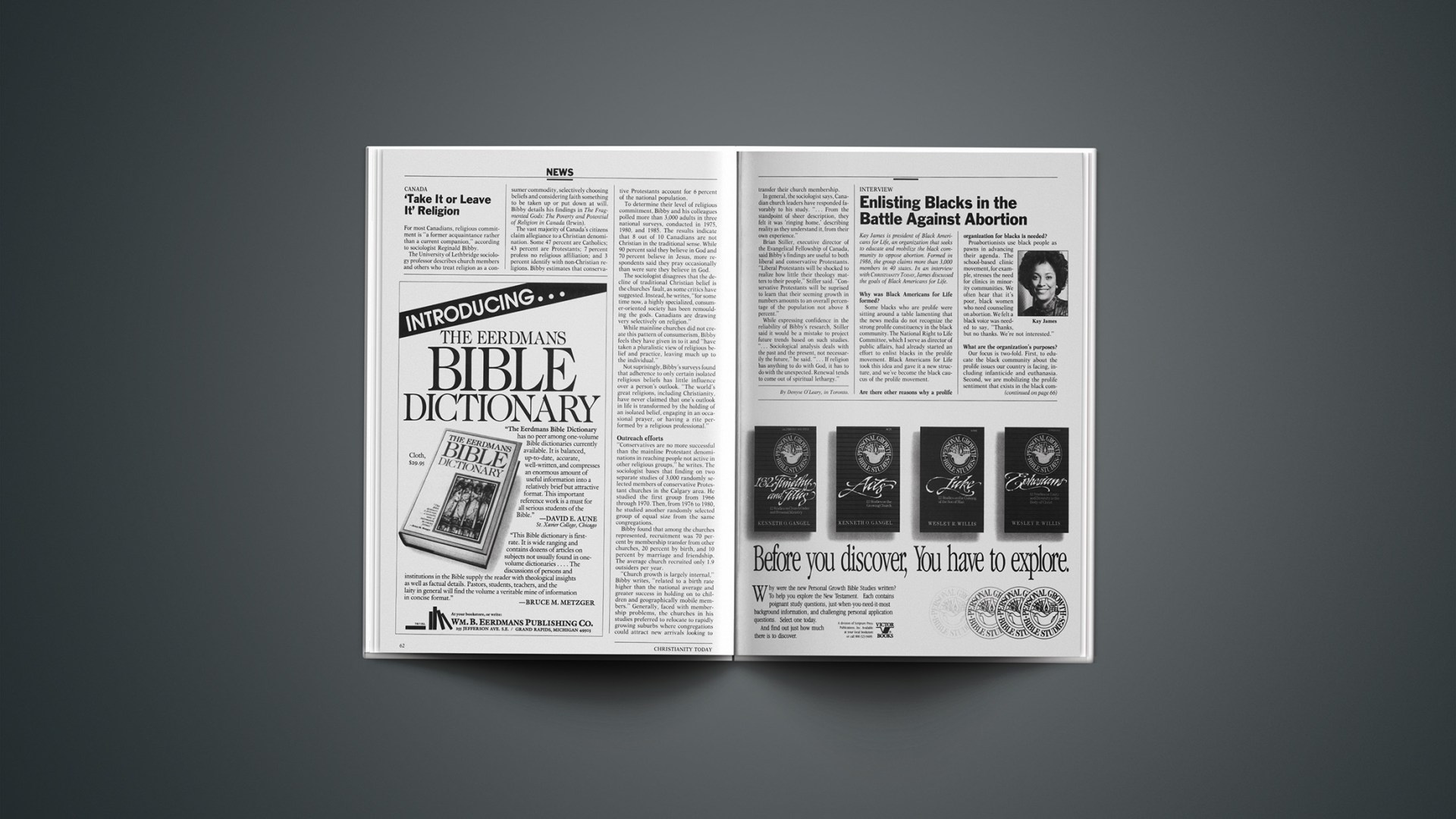For most Canadians, religious commitment is “a former acquaintance rather than a current companion,” according to sociologist Reginald Bibby.
The University of Lethbridge sociology professor describes church members and others who treat religion as a consumer commodity, selectively choosing beliefs and considering faith something to be taken up or put down at will. Bibby details his findings in The Fragmented Gods: The Poverty and Potential of Religion in Canada (Irwin).
The vast majority of Canada’s citizens claim allegiance to a Christian denomination. Some 47 percent are Catholics; 43 percent are Protestants; 7 percent profess no religious affiliation; and 3 percent identify with non-Christian religions. Bibby estimates that conservative Protestants account for 6 percent of the national population.
To determine their level of religious commitment, Bibby and his colleagues polled more than 3,000 adults in three national surveys, conducted in 1975, 1980, and 1985. The results indicate that 8 out of 10 Canadians are not Christian in the traditional sense. While 90 percent said they believe in God and 70 percent believe in Jesus, more respondents said they pray occasionally than were sure they believe in God.
The sociologist disagrees that the decline of traditional Christian belief is the churches’ fault, as some critics have suggested. Instead, he writes, “for some time now, a highly specialized, consumer-oriented society has been remoulding the gods. Canadians are drawing very selectively on religion.”
While mainline churches did not create this pattern of consumerism, Bibby feels they have given in to it and “have taken a pluralistic view of religious belief and practice, leaving much up to the individual.”
Not suprisingly, Bibby’s surveys found that adherence to only certain isolated religious beliefs has little influence over a person’s outlook. “The world’s great religions, including Christianity, have never claimed that one’s outlook in life is transformed by the holding of an isolated belief, engaging in an occasional prayer, or having a rite performed by a religious professional.”
Outreach Efforts
“Conservatives are no more successful than the mainline Protestant denominations in reaching people not active in other religious groups,” he writes. The sociologist bases that finding on two separate studies of 3,000 randomly selected members of conservative Protestant churches in the Calgary area. He studied the first group from 1966 through 1970. Then, from 1976 to 1980, he studied another randomly selected group of equal size from the same congregations.
Bibby found that among the churches represented, recruitment was 70 percent by membership transfer from other churches, 20 percent by birth, and 10 percent by marriage and friendship. The average church recruited only 1.9 outsiders per year.
“Church growth is largely internal,” Bibby writes, “related to a birth rate higher than the national average and greater success in holding on to children and geographically mobile members.” Generally, faced with membership problems, the churches in his studies preferred to relocate to rapidly growing suburbs where congregations could attract new arrivals looking to transfer their church membership.
In general, the sociologist says, Canadian church leaders have responded favorably to his study. “… From the standpoint of sheer description, they felt it was ‘ringing home,’ describing reality as they understand it, from their own experience.”
Brian Stiller, executive director of the Evangelical Fellowship of Canada, said Bibby’s findings are useful to both liberal and conservative Protestants. “Liberal Protestants will be shocked to realize how little their theology matters to their people,” Stiller said. “Conservative Protestants will be suprised to learn that their seeming growth in numbers amounts to an overall percentage of the population not above 8 percent.”
While expressing confidence in the reliability of Bibby’s research, Stiller said it would be a mistake to project future trends based on such studies. “… Sociological analysis deals with the past and the present, not necessarily the future,” he said. “… If religion has anything to do with God, it has to do with the unexpected. Renewal tends to come out of spiritual lethargy.”
By Denyse O’Leary, in Toronto










